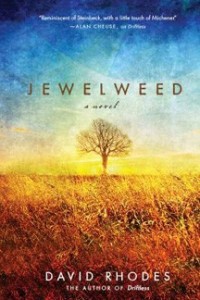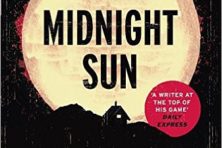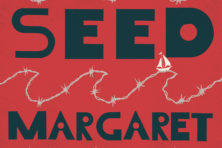A Review
- Share
- Tweet
- Pin
- Share

“When the New Age is at leisure to Pronounce; all will be set right […] & the Daughters of Memory shall become the Daughters of Inspiration.” ~ Epigraph by William Blake
The biography of Wisconsin author David Rhodes is as dramatic as his fiction. After earning an MFA from the Iowa Writers’ Workshop, he wrote three well-received novels during the early 1970s. However, in 1976 a motorcycle accident left him partially paralyzed, a tragic event that compromised not only his mobility but also his literary spirit. After three fallow decades, in 2008 he published Driftless, a best-selling novel set in Wisconsin’s driftless area. He has followed that success with Jewelweed, a novel less well written but still an enjoyable read.
Jewelweed has an elegiac quality, perhaps because this novel serves as the final work of a trilogy: the 1975 Rock Island Line introduced the hard-luck character July Montgomery; Driftless brought him back as an old farmer and saw his tragic death; Jewelweed remembers him as a mythic value center for the characters who were his friends.
The jewelweed wildflower, also known as a touch-me-not, serves as an appropriate emblem for the plot. In the backstory two of the central characters, Blake Bookchester and Danielle “Dart” Workhouse had been a romantically involved couple, but bad choices sent Blake to a lengthy prison sentence and Dart to a life of hardship. As the novel begins, Blake is paroled from prison and begins the process of redemption, of putting his life back together, in part through his reading (he especially favors the philosopher Spinoza), a habit he developed while incarcerated.
The poignant frustrations of Blake and Dart are echoed through the lives of quiet desperation of other characters: a clergywoman experiencing a crisis of faith; a young boy looking for his father; a Vietnam War veteran withdrawing as a hermit; two parents trying to bring normalcy to the life of their handicapped son; an older man dealing with a forbidden love. As the plot progresses before the backdrop of Wisconsin’s driftless area; some of the small towns, such as Word, fictional, but other place names familiar, such as Madison and Dubuque. Against this familiar landscape, unraveled lives slowly are mended
At times the tale seems allegorical with surnames suggestive of lifestyles, for instance, Bookchester and Workhouse; at other times, magical, as when the clergywoman finds herself unexpectedly levitating; occasionally, a children’s story, with two boys befriending a hermit and catching glimpses of a Wild Boy who lives in nature; and at other times didactic, revealing abuses of the prison system or the shortcomings of organized religion.
The colorful characters create a rich tapestry of community, a number of them resurrected from Driftless, some as major players (like Jacob and Winnie Helm), others making cameo appearances (like the Brasso sisters), as if the author were reluctant to bid them and the area a final goodbye. Perhaps because of his own life, Rhodes believes in second chances, the possibility of redemption despite depths of error; the belief that goodness can be found in the hearts of the most seemingly depraved; the conviction that social reform is always a achievable.
Readers who enjoyed Driftless will welcome the opportunity to revisit familiar faces in Jewelweed, but as is the case so often in a photocopy, a family reunion, or a sequal: some of the original charm is inevitably lost. Nonetheless, David Rhodes is a native son whom we value, and not only a storyteller but also a literary craftsman. Perhaps he may be faulted for relying on traditional fictional conventions, but when all is said and done, we all can use a dose of hope.




